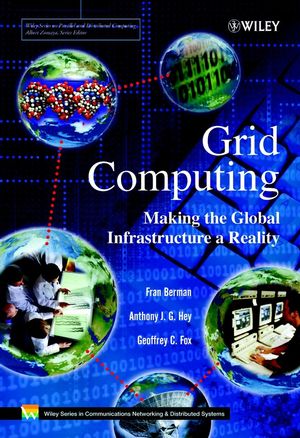Grid Computing: Making the Global Infrastructure a RealityISBN: 978-0-470-85319-1
Hardcover
1060 pages
April 2003
 This is a Print-on-Demand title. It will be printed specifically to fill your order. Please allow an additional 15-20 days delivery time. The book is not returnable.
|
||||||
Grid computing is applying the resources of many computers in a
network to a single problem at the same time
Grid computing appears to be a promising trend for three reasons:
(1) Its ability to make more cost-effective use of a given amount of computer resources,
(2) As a way to solve problems that can't be approached without an enormous amount of computing power
(3) Because it suggests that the resources of many computers can be cooperatively and perhaps synergistically harnessed and managed as a collaboration toward a common objective.
A number of corporations, professional groups, university consortiums, and other groups have developed or are developing frameworks and software for managing grid computing projects. The European Community (EU) is sponsoring a project for a grid for high-energy physics, earth observation, and biology applications. In the United States, the National Technology Grid is prototyping a computational grid for infrastructure and an access grid for people. Sun Microsystems offers Grid Engine software. Described as a distributed resource management tool, Grid Engine allows engineers at companies like Sony and Synopsys to pool the computer cycles on up to 80 workstations at a time.
* "the Grid" is a very hot topic generating broad interest from research and industry (e.g. IBM, Platform, Avaki, Entropia, Sun, HP)
* Grid architecture enables very popular e-Science projects like the Genome project which demand global interaction and networking
* In recent surveys over 50% of Chief Information Officers are expected to use Grid technology this year
Grid Computing:
* Features contributions from the major players in the field
* Covers all aspects of grid technology from motivation to applications
* Provides an extensive state-of-the-art guide in grid computing
This is essential reading for researchers in Computing and Engineering, physicists, statisticians, engineers and mathematicians and IT policy makers.
Grid computing appears to be a promising trend for three reasons:
(1) Its ability to make more cost-effective use of a given amount of computer resources,
(2) As a way to solve problems that can't be approached without an enormous amount of computing power
(3) Because it suggests that the resources of many computers can be cooperatively and perhaps synergistically harnessed and managed as a collaboration toward a common objective.
A number of corporations, professional groups, university consortiums, and other groups have developed or are developing frameworks and software for managing grid computing projects. The European Community (EU) is sponsoring a project for a grid for high-energy physics, earth observation, and biology applications. In the United States, the National Technology Grid is prototyping a computational grid for infrastructure and an access grid for people. Sun Microsystems offers Grid Engine software. Described as a distributed resource management tool, Grid Engine allows engineers at companies like Sony and Synopsys to pool the computer cycles on up to 80 workstations at a time.
* "the Grid" is a very hot topic generating broad interest from research and industry (e.g. IBM, Platform, Avaki, Entropia, Sun, HP)
* Grid architecture enables very popular e-Science projects like the Genome project which demand global interaction and networking
* In recent surveys over 50% of Chief Information Officers are expected to use Grid technology this year
Grid Computing:
* Features contributions from the major players in the field
* Covers all aspects of grid technology from motivation to applications
* Provides an extensive state-of-the-art guide in grid computing
This is essential reading for researchers in Computing and Engineering, physicists, statisticians, engineers and mathematicians and IT policy makers.



